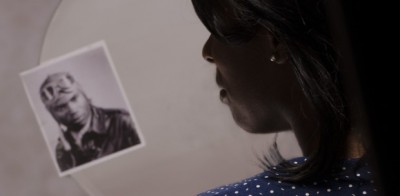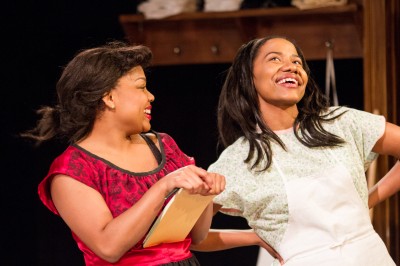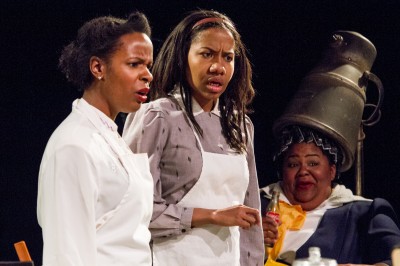Saturday Night/Sunday Morning by Prologue Theatre Company

Directed by TaRon Patton
As part of the Steppenwolf Garage Rep 2014
Heartfelt and funny glimpse into the Southern Black experience during World War II
It is 1945 in Memphis at Miss Mary’s (Kona N. Burks) beauty parlor and boarding house. The place is alive, full of women primping their hair while telling stories of their soldiers overseas and local gossip in Saturday Night/Sunday Morning by Katori Hall. As the War winds down, the women worry about their men and the uncertainty of if and when they’ll return. This is a slice of life story about the folks living in a changing world. We meet the two sisters, Mabel (Krenee Tolson) and Taffy (Jennifer Glasse) who fight often since Mabel love to find men to bed while Taffy finds her ugly looks hurting her quest for a man.

There is the whiny Leanne (McKenzie Chinn) who mops around in grief since her man hasn’t written in years since he went into the service. Miss Mary’s strong presence keeps things going with the polio victim and walking challenged Buzz (Michael Pogue) as one of the few younger men available in Memphis. When Gladys (Angela Alise) arrives from Alabama with her ability to read. write and type, things change at the beauty parlor/boarding house. Gladys stays in Leanne’s room and she falls for Leanne over time. The sisters get Gladys to write Leanne letters supposedly from her man in the Army. This gives Leanne hope that she’ll eventually be reunited with her lover. The adventures of these women makes for many life affirming moments.

This slice of life comic drama has its moments of pathos and rich humor but the work suffers from a much too authentic use of Southern Black dialect. Dialect coach Carrie Hardin has every woman in the cast speaking with the exact same rhythm in their authentic Southern accent. Since no two people actually speak with the exact same manner, having each actor using the same accent and sounding the same dilutes their dialogue. But, the more pressing problem is the tendency for several actors (particularly Kona N. Burks) to speak much too fast while running her words together so fast as to be difficult to understand. Southern folks tend to speak much slower than this cast does. Add the mumbling while swallowing words with that quick utterance and much of the humor and wittiness gets lost. The tendency to use authentic accents, British, Irish or Southern Black is laudable, but the actors (and dialect coaches) must make their actors speak slower and enunciate so as to be understood. Once these players slow down and punch out their dialogue, this sweet and worthy play will come over much better. Don’t let Katori Hall’s heartfelt work get lost in rapid-fire thick accents.
Somewhat Recommended
Tom Williams
